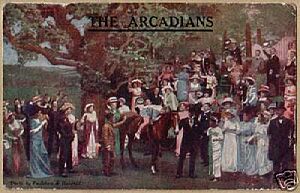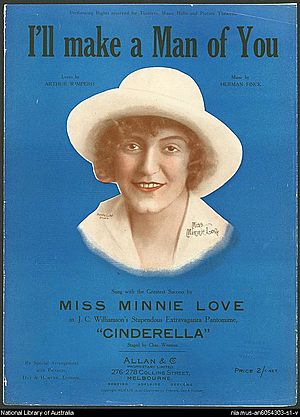Arthur Wimperis facts for kids
Arthur Harold Wimperis (born December 3, 1874 – died October 14, 1953) was an English writer. He wrote plays, song lyrics, and movie scripts. He was very successful in the early 1900s, writing for popular stage musicals. Later, when movies started having sound, he became an even bigger success writing screenplays for films.
Arthur Wimperis started his career as an illustrator. For 25 years, starting in 1906, he wrote lyrics and stories for musical comedies. One of his big hits was The Arcadians in 1909. After fighting in World War I, he continued writing for shows like Princess Charming (1926).
In 1930, he began writing screenplays for British movies. By 1940, he was writing for Hollywood films in the United States. He worked on many screenplays. He even won an Oscar for his work on the movie Mrs. Miniver (1942). He was also nominated for another Oscar for Random Harvest (1942). He kept writing movie scripts until he passed away.
Contents
Biography
Arthur Wimperis was born in London. His parents were Edmund Morison Wimperis and Anne Harry Edmonds. He went to Dulwich College and University College London. He first worked as an illustrator for a newspaper called Daily Graphic. This work was paused when he served in the Second Boer War from 1899 to 1902.
1906–1930: Theatre and Songwriting Years
After the war, Wimperis started writing for the theatre. He wrote song lyrics and stories for musical comedies in London. His first big show was The Dairymaids (1906). Critics liked it, but they noticed one of his songs, "Mary in the Dairy," sounded a bit like an older parody. This was probably because there aren't many words that rhyme with "Mary"!
He then worked on The Gay Gordons in 1907. He also wrote songs for The Arcadians (1909), which became very popular. Some of his famous songs from that show include "The Pipes of Pan" and "Arcady Is Always Young." He also helped adapt operettas from Vienna into English. Two well-known ones are The Balkan Princess (1910) and The Girl in the Taxi (1912). He also wrote for The Sunshine Girl (1912). Many of his songs became hits in music halls, like "Gilbert the Filbert."
During World War I, he served in the Royal Artillery. After the war, he went back to writing plays and songs. He wrote for My Lady Frayle (1916) and Pamela (1917). In 1925, he adapted an American musical called Louie the Fourteenth into English. The next year, he had another hit with Princess Charming in London. His last big success in London was Nippy in 1930. Wimperis also wrote for many other shows in London and New York. He also adapted French and German plays into English.
1930–1953: Film Years
Arthur Wimperis then started writing screenplays and extra dialogue for British films. His first major film was Harmony Heaven in 1930. His movie career grew quickly with the help of director Alexander Korda. He often worked with writer Lajos Bíró. Some of his famous films from the 1930s include The Private Life of Henry VIII (1933) and The Scarlet Pimpernel (1934).
He also wrote the songs for the film Sanders of the River (1936), which starred Paul Robeson. In the 1940s, Wimperis moved to Hollywood and worked for MGM. In 1940, during World War II, he survived a terrible event. The ship he was on, the SS City of Benares, was sunk by a German submarine. He escaped in a lifeboat and was later rescued by a British ship.
He won an Academy Award (Oscar) for his writing on the movie Mrs. Miniver (1942). He even had a small acting part in that film. He was also nominated for another Oscar for his work on Random Harvest (1942). His later films include Julia Misbehaves (1948) and Young Bess (1953).
Arthur Wimperis passed away in Maidenhead, England, when he was 78 years old.
Selected filmography
|
|
 | Toni Morrison |
 | Barack Obama |
 | Martin Luther King Jr. |
 | Ralph Bunche |



